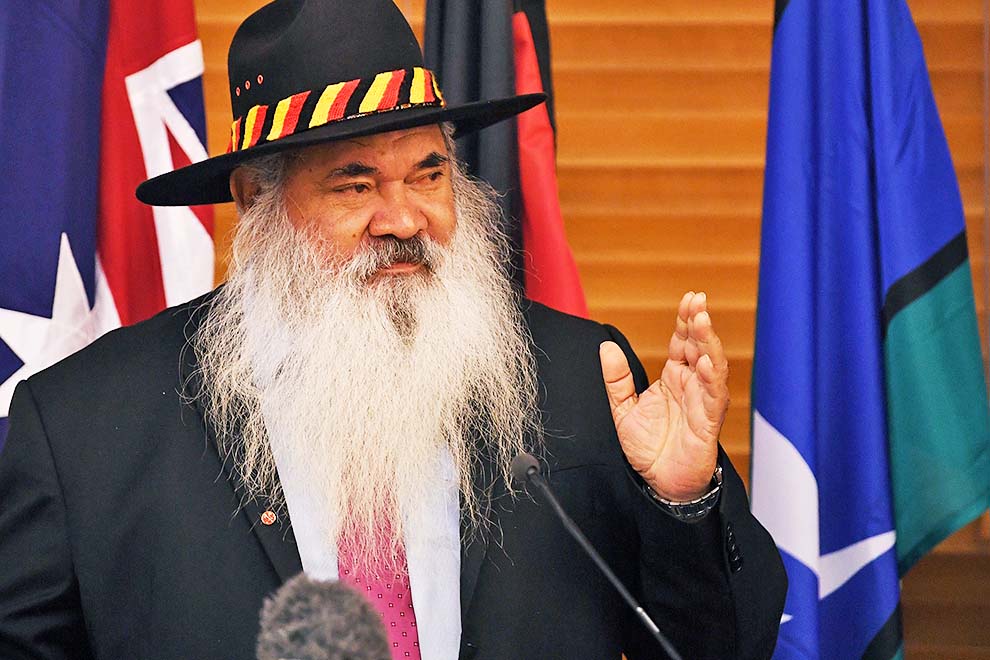When Malcolm Turnbull was communications minister he had a favourite joke he lovingly, repeatedly, used to deflect the blame for problems with the NBN onto the former Labor government. It’s the one where an Irishman, upon being asked for directions to a particular place, replies, “Well, I wouldn’t start from here.”
To me, this hokey gag also applies to the task of excising references to “race” from the Australian Constitution. It’s a good idea, it shouldn’t be too hard, and for the vast majority of Australians it would be a no-brainer. In the twenty-first century, the word “race” obviously doesn’t belong in our legal architecture. But unfortunately we’re starting from here: a decade of entanglement in the issue of constitutional recognition for Indigenous Australians.
De-racing our Constitution didn’t have to be seen from that perspective.
Last month’s Uluru Statement from the Heart eschewed any merely symbolic constitutional amendments, instead recommending something much more ambitious: the creation of a representative Indigenous body. Last week, Labor senator and former Reconciliation Council chair Pat Dodson gave a speech in which he urged that, notwithstanding that Uluru development, the “stubborn stains in our racist Constitution must be erased.”
“Australia cannot move forward,” Dodson said, in the biennial Mabo Oration, “while our founding document, our birth certificate, embodies our racist past.”
He’s right. The two lingering, almost nonchalant constitutional references to “race” really should go. But this need not be an issue that is exclusively, or evenly predominately, about the place of Indigenous people in this country. One of the “r” words is found in the “race power,” section 51(xxvi), which was not, when authored, directed at Aborigines at all; in fact, they were explicitly excluded from its use. Its purpose was to allow the federal government to discriminate against non-European immigrants. The other reference to race, section 25, was inserted partly with Aborigines in mind, but also to cover “foreign races.”
But let’s start at the very beginning. The Australian Constitution Act, passed by Westminster in 1900, contained two references to “race” and two references to “aboriginal.” One of each could be found in one subsection, which came to be known as the race power.
Section 51 read: “The Parliament shall, subject to this Constitution, have power to make laws for the peace, order, and good government of the Commonwealth with respect to…” and subsection (xxvi) said that “the people of any race, other than the aboriginal race in any State, for whom it is deemed necessary to make special laws.”
In the lead-up to the 1967 referendum, the distinguished academic lawyer Geoffrey Sawer wrote about the race power’s “evil origins,” devised as it was to enable the new Commonwealth to “take over from [state governments] the job of persecuting foreigners in general and Asiatics in particular,” including prohibiting them from “owning land, mining, running furniture factories and engaging in various other activities.”
Australians voted by a huge margin in 1967 to delete the words “other than the aboriginal race in any State” and, whether they knew it or not (the question coyly asked voters to agree to “omit certain words relating to the People of the Aboriginal Race in any State”), to kickstart the hitherto dormant race power. It went from evil to noble, allowing the Commonwealth to make laws specifically for the benefit of Aborigines.
That referendum also struck out section 127: “In reckoning the numbers of people of the Commonwealth, or of a State or other part of the Commonwealth, aboriginal natives shall not be counted.” The result was that after 1967 our Constitution contained no mention of Indigenous Australians. But the two references to “race” remained.
The other reference is found in section 25, which, it is sometimes asserted, “allows” states to disqualify people from voting on the basis of race. In reality it recognised that this was what some states were doing at the time, and declared that when this happened, other things would follow.
So now, it’s 2017, and let’s de-race the Constitution! Surely it’s a non-controversial and overdue bit of housekeeping – and, provided you can get both sides of politics on board, it stands a good chance of success?
Not so fast. It’s true, section 25 could be struck out easily, with no repercussions. But the race power is not so straightforward. Simply deleting it could, as constitutional expert George Williams has written, “undermine the validity of existing, beneficial laws already enacted under the power… in areas like land rights, health and the protection of sacred sites.”
If these laws are not to be opened to challenge and, possibly, declared unconstitutional, the contents of section 51(xxvi) would need to be replaced with something, perhaps a form of words allowing the Commonwealth to make laws for the “advancement” or “benefit” of “Indigenous Australians.” It would be a race power that doesn’t mention the “r” word.
That’s all well and good, except the change to section 51(xxvi) also formed a substantial part of what became known as the “minimalist” constitutional recognition model. Resurrecting that change would likely trigger alarm bells among conservative opinion leaders and think tanks and, importantly, their followers in the Coalition party room. Attention-seeking MP after MP would rush onto Sky News to denounce this attempt at “constitutional recognition by the back door.”
If we weren’t starting from here, if instead we had fast forwarded from 2007 to the Uluru Statement, the two issues could remain largely distinct. This would be a proposal for meaningful recognition of Indigenous Australians in the Constitution, that would be a modest suggestion to take “race” out of the Constitution – which will have no material effect on its operation, and has little to do with Reconciliation – because it’s, you know, pretty embarrassing to have that word in there (twice).
Could we start again please?
Probably not. It seems like it’s too late.
Or is it worth a try? •





